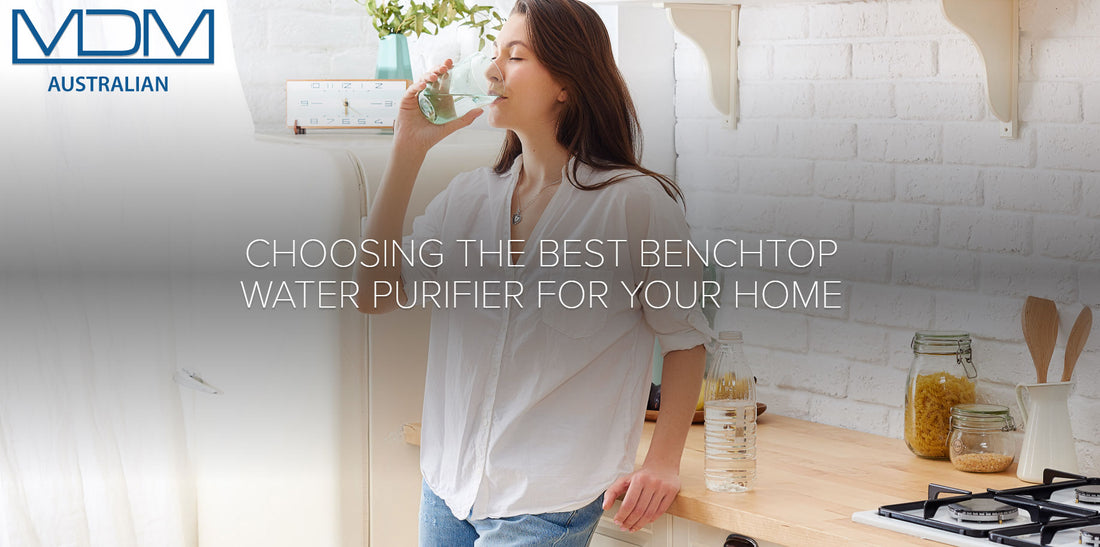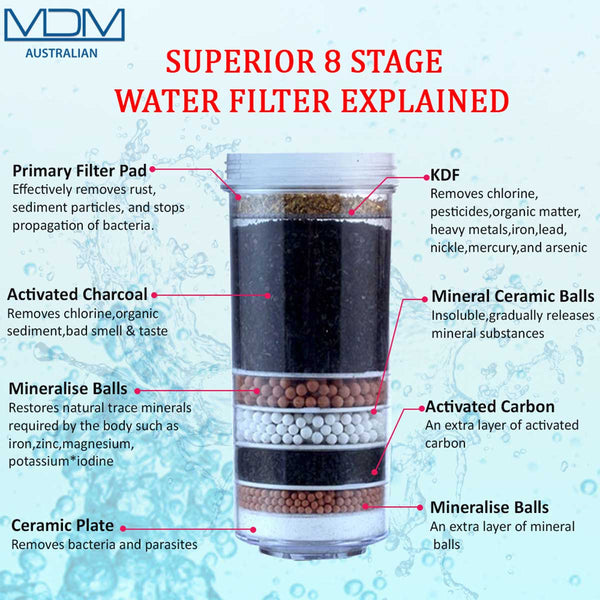
THE ULTIMATE GUIDE TO CHOOSING THE BEST BENCHTOP WATER PURIFIER FOR YOUR HOME
Share
Find the Ideal Benchtop Water Purifier for Your Household
Worrying about unsafe drinking water doesn't let you relax. A world awaits where you drink tap water fearlessly, knowing it's clean and family-friendly. With countless benchtop purifiers available, picking the perfect one seems daunting. But never fear - our ultimate guide simplifies this challenge. It empowers you to make an informed choice with ease.
Here, we dive deep into benchtop water purifiers. You'll navigate complexities around water purification decisions effortlessly. Different purifier types, crucial factors - we leave nothing uncovered. Say goodbye to uncertainty! Embrace crystal-clear, healthy drinking water confidently. Let's embark together on this journey towards a hydrated, worry-free lifestyle!
Understanding Benchtop Water Purifiers
Clean drinking water safeguards health and well-being. Unfortunately, tap water often harbors contaminants and impurities affecting taste and quality. Benchtop water purifiers solve this issue elegantly.
These compact devices install conveniently on kitchen countertops. They remove various impurities like chemicals, sediments, bacteria, and viruses. You get safe, clean drinking water for your whole family.
The key role for a countertop water purifier is enhancing tap water taste and quality. They utilize different filtration methods like activated carbon filters, reverse osmosis systems, and UV filters. This effectively gets rid of harmful stuff to make the water more pure.
Getting a countertop water purifier not just provides cleaner drinking water but also means no more buying bottled water. Less plastic waste and saving money long-term are added benefits.
Coming up, we'll look at the different countertop water purifier types, factors when choosing one, expert top model suggestions, installation and upkeep tips, plus frequently asked questions. Let's dive deep into countertop water purifiers to ensure your best home choice.
Understanding Water Quality Issues
For ensuring clean, safe household drinking water, grasping potential water quality issues is crucial. Tap water may contain various contaminants that could be health risks if consumed without proper treatment. Here, we discuss some common water quality problems and impurities that countertop water purifiers can effectively address.
1. Chlorine: Most municipal water gets chlorine to disinfect it. While killing harmful bacteria, leftover chlorine can impact water taste and odor. Countertop purifiers with activated carbon filters can effectively remove chlorine, providing you fresher, better-tasting water.
2. Heavy Metals: Arsenic, mercury, lead – they lurk in some tap water supplies. They seep in from various places. Advanced water purifiers on your countertop use reverse osmosis. This filters out those dangerous heavy metals. Your drinking water stays free from harm.
3. Microorganisms and Bacteria: Contamination by microbes and bacteria in water is a big issue. Especially where treatment plants are inadequate. But benchtop purifiers have UV filtration systems. They kill off harmful bacteria and viruses effectively. Giving you microbiologically safe drinking water.
4. Sediments: Things like dirt, sand, rust particles – they get into tap water. From old pipes or municipal distribution networks. Benchtop purifiers have sediment filters though. These trap and remove those particles efficiently. Leaving you with clearer, cleaner water.
5. Chemical Contaminants: Tap water carries chemical nasties too. Pesticides, herbicides, industrial chemicals, drug residues. Multi-stage filters in benchtop purifiers reduce these contaminants. With activated carbon filters too. Improving overall water quality significantly.
Benchtop water purifiers tackle common water quality woes. Contaminant by contaminant. Ensuring you drink safe, clean, healthy water always. When choosing one, ensure it tackles problems specific to your water supply. Optimal filtration performance guaranteed.
Types of Benchtop Water Purifiers
Choosing a benchtop water purifier involves considering several kinds. Each type employs unique technologies to eliminate impurities, ensuring clean drinking water. Three common benchtop water purifiers:
1. 8 Stage Activated Carbon Filters
Activated carbon filters rank among the most widespread benchtop water purifiers. These utilize activated carbon, highly proficient at removing organic pollutants, chlorine, and unpleasant odors and tastes from water. The activated carbon possesses a vast surface area, effectively trapping and absorbing impurities, boosting the water's taste and quality. Let's see how the 8 Stage water fitlers work
Stage 1: Filter Pads
Filter Pads are placed in the water filter to improve the quality of water flowing through it. Filter pads conduct a separation process that removes any solid-like rust or, any sediment suspended in taps from the liquid at the primary stage itself.
Stage 2: KDF
Kinetic Degradation Fluxion (KDF) is a copper-zinc formulation of very high quality. It uses a chemical process called redox, or oxidation/reduction. It helps in the removal of lead, chlorine, mercury, hydrogen sulphide, and iron from the water. During this reaction, harmful contaminants are changed into non-toxic components. Chlorine, for instance, is transformed into benign, water-soluble chloride, which can then be carried harmlessly through the water supply. The process also decreases the accumulation of limescale in water.
Stage 3: Activated charcoal
Activated charcoal is used in stage 3 as it is very effective at removing toxins from the water. It removes toxins like volatile organic compounds and chlorine, without the usage of harsh chemicals which may destroy the salts and minerals present in the water. Along with removing a lot of the harmful components, they can also add essential minerals. These essential minerals - calcium, magnesium, and iron, are put back into the water. This step also eliminates the foul smell and taste associated with chlorine.
Stage 4: Mineralized balls
Mineralized balls have several remarkable anti-bacterial and purification properties. These balls create vibrations that break the molecules into small clusters. Thus, adding back essential minerals like zinc, iron, potassium, lithium, magnesium, and iodine.
The balls have a connection with small poles to form an ideal filtration process where the fluid with any contamination goes through a unique pore-size filtration system. This separates toxins from processed water.
Stage 5: Ceramic balls
In the fifth stage, the Advanced 8 stage filter makes use of the ceramic balls to expel any harmful bacteria or sediment present in the water. It processes the water thoroughly and removes all pathogens through a network of pores. They are highly effective in the declination of impurities like chloroform and heavy metals present in tap water.
Stage 6: Active carbon
In this stage, there is another finer, granular layer of active carbon, which helps to make the water alkaline. There's a much greater surface of active carbon which bonds with even more contaminants and remove them more reliably. It is an effective adsorbent as it is highly porous. Hence, it can absorb natural organic compounds, taste and odour, and synthetic organic chemicals.
Stage 7: Mineralized balls
This stage uses an extra and an even finer layer of mineralized balls to make sure that the water you consume is safe and healthy. It restrains any leftover pathogens or odour present in the water.
Stage 8: Ceramic plate
This is the final stage of the filtration process, which has the potential to get rids of any remaining bacteria. The silver ions impregnated in ceramic repel growth of bacteria and algae on the surface of the filter. With this, high-quality filtered water is ready to be consumed safely.
2. Reverse Osmosis Systems
Reverse osmosis systems encompass a semi-permeable membrane that expels contaminants by forcing water through at high pressure. This technology excels at eliminating a wide array of impurities, including heavy metals, bacteria, viruses, and dissolved solids. Reverse osmosis systems provide clean, pure drinking water. Nevertheless, they typically necessitate professional installation and regular maintenance for optimal performance.
3. UV Filters
UV filters harness ultraviolet light to sterilize water and annihilate bacteria, viruses, and other microorganisms. The UV light ravages these pathogens' DNA, rendering them innocuous. UV filters excel against microbiological contaminants, making them superb for households concerned about waterborne diseases. Yet, UV filters do not eliminate chemical pollutants or enhance water's taste.
Each benchtop water purifier is unique, offering benefits along with drawbacks. In choosing which one fits your home best, contemplate the particular water issues needing addressing, available budget, and your capacity for maintenance. Seeking purifiers independently tested and certified by trusted organizations ensures effectiveness in eliminating contaminants.
Remember this: Selecting the appropriate benchtop water purifier ensures access to clean, safe, and great-tasting drinking water for you and your loved ones.
Factors to Consider When Choosing a Benchtop Water Purifier
When selecting a benchtop water purifier for your home, several crucial factors demand consideration. These factors guarantee you choose a purifier tailored to your specific needs, providing clean and safe drinking water. Keep these key factors in mind:
1. Filter Lifespan
The filter's lifespan is an essential consideration. Seek purifiers whose filters have a lengthy lifespan before requiring replacement. This will save you time and money long-term.
2. Certifications
Verify if the benchtop water purifier holds certifications from reputable organizations like NSF International or the Water Quality Association. These certifications confirm the purifier meets industry water filtration standards.
3. Installation Requirements
When looking at installing a purifier, some devices might need an expert's touch, while others are user-friendly. Pick one matching your skillset and resources available.
4. Maintenance
Assess how much upkeep the purifier demands. Go for models easily cleaned and maintained. Regular care ensures optimal efficiency and a longer lifespan.
5. Water Flow Rate
Consider the water flow rate carefully. Ensure it can provide enough filtered water for your household's needs.
6. Contaminant Removal
Check what contaminants it's designed to remove. Different purifiers target specific ones like chlorine, lead, or microbial pathogens. Choose one addressing your area's water quality issues effectively.
7. Cost and Value
Think about the initial cost and any ongoing expenses like filter replacements. While sticking to your budget is crucial, value for money trumps the lowest price.
Factoring these in will help you make an informed choice for a benchtop water purifier. Remember, it's vital to select one aligning with your specific water quality needs, providing clean, safe, and healthy drinking water for you and your family.
Experts Suggest Top Benchtop Water Purifiers
When looking for the ideal benchtop water purifier, consider experts' recommendations. With thorough evaluations, they identify top performers regarding effectiveness, features, and value. Here are highly recommended benchtop water purifiers:
1. Aimex Water Purifier 8 Stage Water Filter Dispenser 20L Maifan Stone:
- Key Aspects: Advanced 8-stage filtering, including mafian stons, removes contaminants for pure drinking water.
- Advantages: Aimex offers high-quality filtration. Simple installation, compact countertop design.
- Also available in Aimex 16L Water Purifier.
- Aimex Water Stainless Steel 304 Gravity Multi-Stage Purifier
- Aimex Premium Hot and Cold Freestanding Benchtop Water Cooler
2. BWT Vida Water Filter Pitcher:
- Key Aspects: Patented BWT Magnesium Tech filters impurities, adds beneficial minerals for taste enhancement.
- Advantages: Easy-use, large capacity, affordable portable purification solution.
3. APEC Water Systems ROES-50 Reverse Osmosis Water Filter:
- Key Aspects: 5-stage filtration removes contaminants like chlorine, lead, bacteria.
- Advantages: Superior filtration performance. Easy maintenance, high-quality drinking water.
4. Big Berkey Water Filter System:
Simple design serves large households. Gravity makes it work! Removes many toxins through two purifying elements.
This Berkey model stands tall with reliability and adaptability. It clears out numerous pollutants efficiently.
Before purchase, think about your home size and water issues. Look for certifications like NSF, ANSI, or WQA to verify quality.
Our suggestions stem from experts' input, but pick what fits your needs and budget.
Installation and Maintenance Tips
Proper setup and upkeep ensure peak benchtop purifier performance long-term. Use these tips for healthy drinking water:
1. Read the manufacturer's instructions
Study the manual before beginning. Each purifier has unique install and maintain guidelines.
2. Choose a suitable location
Place it near water and power sources away from heat/sun. Ventilation prevents bacteria/mold growth.
3. Check for compatibility
Before installing, make certain the purifier matches your water source or faucet. Some models require special adapters or connectors. If uncertain, verify specs or consult the manufacturer.
4. Install according to instructions
Carefully follow step-by-step manufacturer instructions for proper installation. Connect hoses, filters, and fittings securely. Improper setup risks leaks or reduced effectiveness.
5. Replace filters regularly
Filters remove contaminants, so timely replacements per manufacturer guidance are crucial for optimal filtration. Set reminders to track replacement dates and avoid impurity buildup.
6. Clean and sanitize
Periodically clean and sanitize your purifier using manufacturer-approved methods and non-abrasive cleaners. This maintains performance and prevents bacteria or mold growth.
7. Schedule professional maintenance
Consider yearly professional maintenance. Experts can inspect, service, and ensure your system functions efficiently and effectively.
Proper installation and regular maintenance are vital for benchtop water purifier performance and longevity. Follow these tips and manufacturer recommendations for clean, healthy drinking water.
Common Questions About Benchtop Water Purifiers
Q: Why use a benchtop water purifier?
Benchtop water purifiers remove contaminants like chlorine, lead, and bacteria from your home's water supply. They ensure your family drinks clean, safe water. This provides peace of mind.
Q: How do benchtop water purifiers function?
Different purifier types work through various filtration methods. Activated carbon filters absorb impurities. Reverse osmosis systems use a membrane to filter contaminants. UV filters neutralize bacteria and viruses with ultraviolet light radiation. Each type has its unique purification process but delivers clean drinking water.
Q: What contaminants can benchtop water purifiers eliminate?
Chlorine. Heavy metals like lead, mercury. Pesticides, herbicides. Volatile organic compounds (VOCs). Microbial contaminants. Benchtop purifiers target common tap water contaminants. Some models also remove fluoride or nitrates, depending on the specific filtration tech utilized.
Q: How frequently must filters be replaced in benchtop water purifiers?
Filter replacement frequency varies by model and usage level. Typically, activated carbon filters require changing every 3-6 months. Reverse osmosis membranes last 1-3 years. UV bulbs need annual replacement. Following manufacturer guidelines for replacement ensures optimal purifier performance and consistently clean drinking water.
Q: Are benchtop water purifiers easy to install?
Absolutely, benchtop water purifiers offer simple installation. They come with instructions. Just connect to your kitchen faucet or water supply. Some models install under the sink. Pick one matching your setup and abilities.
Q: Is regular maintenance required for benchtop water purifiers?
Yes, benchtop water purifiers need regular upkeep. This involves cleaning routines, filter replacements, and checking for any issues or leaks. Following manufacturer guidelines ensures optimal performance and longevity.
Q: How can I determine the quality of a benchtop water purifier?
Look for certifications and authorized stores when selecting. These validate performance and reliability. Check reviews and ratings from other users too. Compare key features like filter life, water flow rate, and warranty coverage. This helps assess the quality for your home needs.
Answering these frequently asked questions provides valuable guidance for benchtop water purifier buyers.


